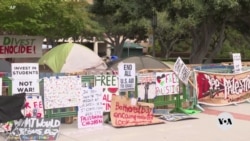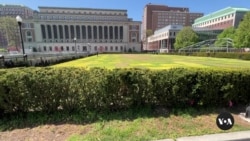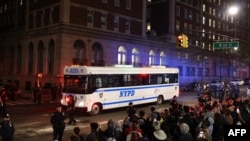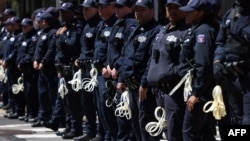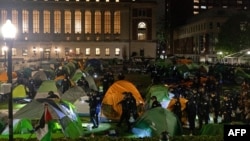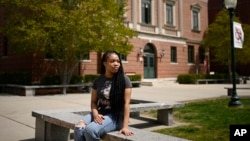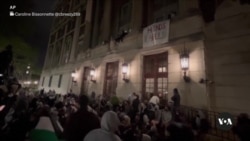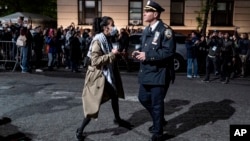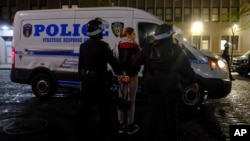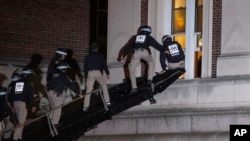Student Union
- By VOA News
What to ask on a college visit
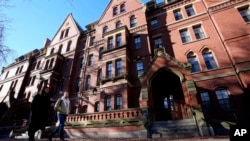
Sarah Wood lists 32 questions for applicants to learn more during a campus visit. (April 2024)
- By VOA News
US is now the most desirable country for international students

That’s according to this year’s Emerging Futures research survey, from education consultant IDP Connect. Other Western countries have slipped due to new visa restrictions and caps on international students. Read a summary of the research from ICEF Monitor. (April 30, 2024)
Pro-Palestinian protesters break through barricades to retake MIT encampment

Pro-Palestinian protesters who had been blocked by police from accessing an encampment at the Massachusetts Institute of Technology on Monday broke through fencing, linked arms and encircled tents that remained there, as Columbia University canceled its university-wide commencement ceremony following weeks of pro-Palestinian protests.
Sam Ihns, a graduate student at MIT studying mechanical engineering and a member of MIT Jews for a Ceasefire, said the group has been at the encampment for the past two weeks and that they were calling for an end to the killing of thousands of people in Gaza.
"Specifically, our encampment is protesting MIT's direct research ties to the Israeli Ministry of Defense," he said.
Protesters also sat in the middle of Massachusetts Avenue, blocking the street during rush hour in the Boston area.
The demonstrations at Columbia have roiled its campus and officials said Monday that while it won't hold it's main ceremony, students will be able to celebrate at a series of smaller, school-based ceremonies this week and next.
The decision comes as universities around the country wrangle with how to handle commencements for students whose high school graduations were derailed by COVID-19 in 2020. Another campus shaken by protests, Emory University, announced Monday that it would move its commencement from its Atlanta campus to a suburban arena. Others, including the University of Michigan, Indiana University and Northeastern, have pulled off ceremonies with few disruptions.
Columbia's decision to cancel its main ceremonies scheduled for May 15 saves its president, Minouche Shafik, from having to deliver a commencement address in the same part of campus where police dismantled a protest encampment last week. The Ivy League school in upper Manhattan said it made the decision after discussions with students.
"Our students emphasized that these smaller-scale, school-based celebrations are most meaningful to them and their families," officials said.
Most of the ceremonies that had been scheduled for the south lawn of the main campus, where encampments were taken down last week, will take place about 8 kilometers (5 miles) north at Columbia's sports complex, officials said.
Speakers at some of Columbia's still-scheduled graduation ceremonies include Pulitzer Prize-winning playwright James Ijames and Dr. Monica Bertagnolli, director of the National Institutes of Health.
Columbia had already canceled in-person classes. More than 200 pro-Palestinian demonstrators who had camped out on Columbia's green or occupied an academic building were arrested in recent weeks.
Similar encampments sprouted up elsewhere as universities struggled with where to draw the line between allowing free expression while maintaining safe and inclusive campuses.
The University of Southern California earlier canceled its main graduation ceremony. Students abandoned their camp at USC on Sunday after being surrounded by police and threatened with arrest.
Other universities have held graduation ceremonies with beefed-up security. The University of Michigan's ceremony was interrupted by chanting a few times Saturday. In Boston on Sunday, some students waved small Palestinian or Israeli flags at Northeastern University's commencement in Fenway Park.
Emory's ceremonies scheduled for May 13 will be held at the GasSouth Arena and Convocation Center in Duluth, almost 20 miles (30 kilometers) northeast of the university's Atlanta campus, President Gregory Fenves said in an open letter.
"Please know that this decision was not taken lightly," Fenves wrote. "It was made in close consultation with the Emory Police Department, security advisors and other agencies — each of which advised against holding commencement events on our campuses."
The 16,000-student university is one of many that has seen repeated protests stemming from the conflict that started Oct. 7 when Hamas militants attacked southern Israel, killing about 1,200 people, mostly civilians, and taking roughly 250 hostages. Student protesters are calling on their schools to divest from companies that do business with Israel or otherwise contribute to the war effort.
Vowing to destroy Hamas, Israel launched an offensive in Gaza that has killed more than 34,500 Palestinians, about two-thirds of them women and children, according to the Health Ministry in the Hamas-ruled territory. Israeli strikes have devastated the enclave and displaced most of its inhabitants.
Hamas on Monday announced its acceptance of an Egyptian-Qatari cease-fire proposal, but Israel said the deal did not meet its "core demands" and that it was pushing ahead with an assault on the southern Gaza town of Rafah.
"Cease-fires are temporary," said Selina Al-Shihabi, a Georgetown University sophomore who was taking part in a protest at George Washington. "There can be a cease-fire, but the U.S. government will continue to arm the Israeli military. We plan to be here until the university divests or until they drag us out of here."
At the University of California, San Diego, police cleared an encampment and arrested more than 64 people, including 40 students.
The University of California, Los Angeles, moved all classes online for the entire week due to ongoing disruptions following the dismantling of an encampment last week. The university police force reported 44 arrests but there were no specific details, UCLA spokesperson Eddie North-Hager said in an email to The Associated Press.
Schools are trying various tactics from appeasement to threats of disciplinary action to get protestors to take down encampments or move to campus areas where demonstrations would be less intrusive.
The School of the Art Institute of Chicago said in a Facebook post Sunday that it offered protesters "amnesty from academic sanction and trespassing charges" if they moved.
"Many protesters left the premises of their own accord after being notified by the police that they were trespassing and subject to arrest," the school said. "Those that remained were arrested after multiple warnings to leave, including some of whom we recognized as SAIC students."
A group of faculty and staff members at University of North Carolina at Chapel Hill asked the administration for amnesty for any students who were arrested and suspended during recent protests. UNC Faculty and Staff for Justice in Palestine said in a media advisory that it would deliver a letter on behalf of more than 500 faculty who support the student activists.
Other universities took a different approach.
Harvard University's interim president, Alan Garber, warned students that those participating in a pro-Palestinian encampment in Harvard Yard could face "involuntary leave." That means they would not be allowed on campus, could lose their student housing and may not be able to take exams, Garber said.
Columbia University cancels main commencement after protests that roiled campus for weeks
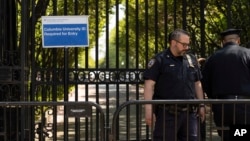
Columbia University is canceling its large university-wide commencement ceremony amid ongoing pro-Palestinian protests but will hold smaller school-based ceremonies this week and next, the university announced Monday.
"Based on feedback from our students, we have decided to focus attention on our Class Days and school-level graduation ceremonies, where students are honored individually alongside their peers, and to forego the university-wide ceremony that is scheduled for May 15," Columbia officials said in a statement.
The protests stem from the conflict that started Oct. 7 when Hamas militants attacked southern Israel, killing about 1,200 people, mostly civilians, and taking roughly 250 hostages. Vowing to destroy Hamas, Israel launched an offensive in Gaza that has killed more than 34,500 Palestinians, about two-thirds of them women and children, according to the Health Ministry in the Hamas-ruled territory. Israeli strikes have devastated the enclave and displaced most of its inhabitants.
The University of Southern California earlier canceled its main graduation ceremony while allowing other commencement activities to continue.
- By VOA News
Where Are Pro-Palestinian Campus Protests Happening?
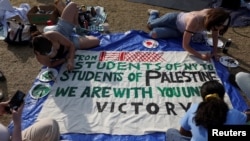
Colleges in the U.S. have been rocked by a wave of campus protests calling for an end to the war in Gaza, and for U.S. colleges to divest from Israel.
The Wall Street Journal’s Steven Russolillo rounds up some of the most important ones. (April 2024)
Pro-Palestinian protests in US could impact 2024 election
Despite the fact that many of their encampments at university campuses have been dismantled, pro-Palestinian demonstrators in the United States are standing their ground. If the protests continue, some analysts say they could have an impact on the 2024 presidential election. VOA’s Veronica Balderas Iglesias explains.
- By VOA News
Pro-Palestinian protest ends quietly at University of Southern California
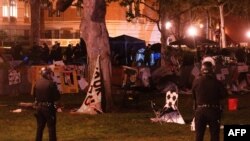
Pro-Palestinian protesters at an encampment at the University of Southern California, one of the focal points of anti-Israel protests across U.S. college campuses, left the scene early Sunday after authorities warned them that they could be arrested.
Their departure came after university safety officers and Los Angeles police began clearing the center of campus, where police had arrested 93 people on April 24.
"If you are in the center of campus, please leave,” the university warned the protesters on the social media platform X, saying they could be arrested if they stayed.
Elsewhere, pro-Palestinian protests continued at several college graduation ceremonies on Saturday.
At the University of Virginia, 25 people were arrested for trespassing after police clashed with pro-Palestinian protesters who refused to remove tents from the campus.
At the University of Michigan, demonstrators chanted anti-war messages and waved flags during graduation ceremonies. More protests occurred at Indiana University, Ohio State University, Princeton University in New Jersey and Northeastern University in Massachusetts.
- By VOA News
Amid internship pressure, international students should focus on self-care
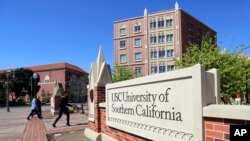
That’s the argument of Edhita Singhal, an international student from India studying at the University of Southern California.
Despite the fear of not finding a good internship, it’s important to relax and take care of yourself, she writes in her biweekly column for campus newspaper The Daily Trojan. (April 2024)
- By Tina Trinh
Columbia students on edge as police presence remains on campus after raid to clear protesters
Police remain on Columbia University’s campus, even after clearing out student protesters and their encampment. But questions remain about how the university and the students move forward. Tina Trinh reports from New York.
Columbia University student journalists had an up-close view for days of drama
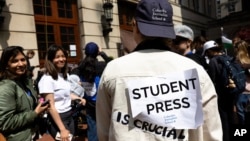
Student journalists on the Columbia University campus knew what was coming long before police with riot shields arrived to begin arresting the pro-Palestinian protesters.
They had watched the situation spiral as the protesters stood their ground, refusing to abandon Hamilton Hall and using a pulley system to bring supplies into the building they had occupied.
The reporters, working for university and online U.S. and international publications, suspected negotiations with administrators were going nowhere when the protesters began donning COVID-era masks to hide their identities. Some began sleeping on the floor in journalism classrooms or offices out of fear of missing something.
But when a journalism professor began writing the phone number to call if they were arrested in permanent marker on their arms, that was the moment it became clear: They were capturing history.
The police operation Tuesday night that cleared out Hamilton Hall capped two weeks of drama over the protests at Columbia, which student journalists at the Ivy League school lived through as they were covering it.
Other media were being kept off campus, so these reporters were the only ones who could capture what was happening.
"I just woke up and I was like, I'm going to go and take some pictures," said Seyma Bayram, a Columbia journalism fellow focused on creating a longform investigative podcast unrelated to the protests.
The encampments were a visual feast. There were musical performances, students reading and helping each other write papers for their classes. She wanted to document it all.
By Monday, students were facing suspension if they didn't leave. Crowds marched around the encampment chanting. Students were given written notices from the administration, warning them to go. They ripped them up, dumped them in trash bins. Rumors were flying.
That night, Bayram was unwilling to go home, sleeping on her office floor.
"How," she wondered, "are they going to remove the students. They're not leaving."
By Tuesday, she was exhausted. The student reporters charged their cameras and other gear and waited.
Many protesters were starting to leave, recalled Shayeza Walid, a graduate journalism student at Columbia, who covered the arrests for the news website Al-Monitor.
The sun was setting as they held hands and chanted, knowing they faced academic repercussions by remaining. Many had given up covering their faces by now, Walid said.
To her, the chants sounded like a hymn and she saw the protesters, some clad in Palestinian keffiyehs, crying. She doubts she will ever forget it.
"It felt so both inspirational and devastating because these were the kids who were willing to get arrested," she recalled.
And then police started assembling outside, setting up barricades. Even on campus, Bayram could tell by the photos posted on social media that police action was imminent. And then the police were there.
"I don't know, it was just like all of a sudden there were just like police, ... riot gear everywhere," Bayram said.
The student journalists were walking backward, filming as they went, Bayram said.
She was pushed off campus. Police buses and officers were everywhere. Around her, people were being arrested.
"Those of us who are pushed out, like student reporters and faculty, I think we were just all horrified that no press was present outside of, or inside of, Hamilton Hall," Bayram said.
Walid recalled that the reporters paired up for safety. Her partner, an international student, had never seen so many police in one place. "And frankly, I hadn't either," Walid said.
She said the police also seemed shocked when they came into campus and saw how few students were left. "It was very evidently disproportionate from where we were standing," she said.
Before the arrests, protesters inside the campus used a megaphone to lead those protesting outside in chants, recalled Cecilia Blotto, a graduate journalism student, who has been publishing photos and video to Uptown Radio, a project of the university's journalism program.
"Columbia, you are a liar," she recalled them chanting, along with "Disclose, divest! We will not stop, we will not rest."
Then Blotto saw police buses pull up, officers exiting with shields and zip ties. Then they played a recording saying that if the protesters didn't disperse they would be arrested.
"People were like being dragged out on the street, with like four cops holding a leg and an arm each. I saw some really, like, striking images of people, like, yelling shame at the cops, while they were dragging out students," Blotto said. She tried to film it all.
Emily Byrski, a graduate student who had a phone number written on her arm in case she was arrested, said the students weren't totally unprepared. There had been a training session.
Still, she said, there had been so many false alerts.
"It's like the boy who cried wolf. Like, there were two or three nights here where we were told, there was a rumor going around that the NYPD was coming, please come to campus," she recalled.
Byrski had knee surgery earlier in the year, so was unable to run as police descended. She limped along with her buddy.
"So we're sort of seeing this all happen from inside and trying to document it as the NYPD is grabbing people, like shoving them to the ground. It was pretty horrifying to see, like, right a foot away from me," Byrski said.
She said she has seen professors cry over the last week. She is pondering it all, uncertain what to make of it.
"I'm just sort of in shock," Byrski said. "I think we all kind of were in shock."
Botched US student aid application form rollout leaves many in limbo
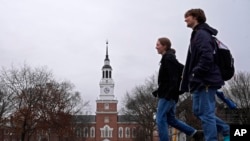
The last thing standing between Ashnaelle Bijoux and her college dream is the FAFSA form — a financial aid application that's supposed to help students go to college but is blocking her instead. She has tried to submit it over and over. Every time, it fails to go through.
"I feel overwhelmed and stressed out," said Bijoux, 19. She came close to tears the last time she tried the form. "I feel like I'm being held back."
Normally a time of celebration for high school seniors, this spring has been marred by the federal government's botched rollout of the new FAFSA application. By May 1, students usually know where they're headed to college in the fall. This year, most still haven't received financial aid offers. Three months before the start of fall classes, many don't know where they're going to college, or how they're going to pay for it.
"We're asking them to make probably one of the biggest financial decisions — and decisions that will have the biggest implications on their lives going forward — without all of the information," said Justin Draeger, president and CEO of the National Association of Student Financial Aid Administrators.
FAFSA, or Free Application for Federal Student Aid, went through a massive overhaul that was supposed to make it simpler and shorter. But a series of blunders by the Education Department made it harder than ever, delaying college decisions by months and raising fears that hundreds of thousands of students will forgo college entirely.
Across the United States, the number of students who have successfully submitted the FAFSA is down 29% from this time last year, and it's even worse at schools with more low-income students, according to the National College Attainment Network.
The group's CEO, Kim Cook, warned members of Congress this month about a potentially "catastrophic" drop in college enrollments that would make the decreases of the pandemic seem mild.
For Bijoux of Norwich, Connecticut, the FAFSA problems threaten to undermine the promise of higher education.
To her, college is a chance to seize the opportunities that weren't available to her mother, who immigrated from Haiti to the U.S. as an adult. Bijoux hopes to become a therapist and set a positive example for her three younger brothers.
If her FAFSA goes through, she should be eligible for enough financial aid to help with the $13,000-a-year tuition at Southern Connecticut State University. If not, she might go to a local community college, but even that would require loans if she can't complete the FAFSA.
"That's why it hurts, because it's like you work so hard to go somewhere and do something and make something of yourself," Bijoux said. "I thought I would start at a four-year (college) and then work hard continuously, like I've been doing basically my whole life. But that's not the case."
The updated FAFSA form has one section filled out by students and another by their parents. But when Bijoux finishes her part, nothing shows up on her mom's online account. She keeps trying, but nothing seems to change.
Similar problems have been reported across the country, along with numerous other bugs that the Education Department has scrambled to fix. Families who call for customer service have faced long wait times or say the call center hung up on them.
It "drains all the momentum" from families working to send their children to college, especially those navigating the process for the first time, said Anne Zinn, a counselor at Norwich Free Academy, where Bijoux goes to school.
"I can only say so many times, 'Just be patient, just be patient,' before they throw their hands up and they're like, 'Why am I doing this? I'm just going to go get a job,'" she said.
The rollout has attracted bipartisan criticism in Congress, and it's being investigated at the request of Republicans. Last week, Richard Cordray, the federal student loan chief who oversaw the FAFSA update, announced he's stepping down at the end of June.
For colleges, too, the delays pose a major threat.
Enrollment decreases like those being projected now could put many small colleges out of business or necessitate deep cuts in staff. Some colleges are pushing for emergency relief just to stay afloat, said Angel Pérez, CEO of the National Association for College Admission Counseling.
"If they don't get checks from the federal government to basically get them through next year, they will not survive," Pérez said.
FAFSA has been the linchpin of student financial aid for decades. It's used to determine eligibility for the federal Pell grant, a scholarship for low-income students, and it's required to receive federal student loans. Colleges and states also use FAFSA to distribute their own scholarships.
FAFSA had long been maligned for being tedious, difficult and intimidating to families without college experience. Congress passed legislation in 2020 meant to simplify the form. The Education Department was ordered to reduce the number of questions from more than 100 to about 40 and change the formula to expand aid to more students.
Problems started piling up as soon as the new form went online in December, already months overdue.
The first applications were incorrectly processed using an outdated calculation for inflation. Later, a federal contractor miscalculated a different formula on more than 200,000 applications. Each mistake added to delays, leaving students waiting longer to hear anything about financial aid.
Even more worrisome is a misstep that blocked students from finishing the form if they have a parent without a Social Security number. Advocates say the system locked out hundreds of thousands of students who are U.S. citizens or permanent residents but whose parents are not.
The Education Department on Tuesday said it's giving those parents a new way to enter their tax information manually. But as recently as this week, some students said they were still blocked from submitting the form.
Federal education officials say they're addressing lingering bugs but making progress. More than 8 million student applications have now been processed and sent to colleges, the agency said, and new applications are being processed within three days.
Still, the wait is far from over. It usually takes weeks for schools to prepare financial aid offers. Some colleges have extended decision deadlines to give students more time to weigh their options. But some stuck to May 1, forcing students to choose a college — and make a nonrefundable payment to hold their spot — without knowing all their scholarship options.
In Baltimore, Camryn Carter is waiting to find out if he'll get a full ride to the University of Maryland or face tens of thousands of dollars in student loans.
A top student and captain of his baseball and wrestling teams, Carter sees college as a step up in life. He thinks back to the times in the grocery store line when he had to put items back on the shelf because his mom couldn't afford the bill. A college degree would give him the stability he didn't always have, the 18-year-old said.
But when he looks at tuition, it's intimidating. Along with Maryland, he's also considering McDaniel College, a private school in Maryland. If he enrolls there, he expects to borrow almost $30,000 a year.
"I try to make the best decisions now so I can have a good future," he said. "I'm a little nervous that things won't work out. But I'm faithful."
- By VOA News
Florida program helps migrant students tutor younger children
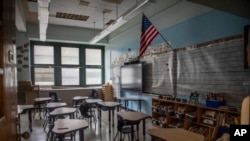
The 40-year-old initiative pairs migrant students in high school with elementary school children. High schools earn college scholarship money for their work. (April 2024)
Former students at for-profit Art Institutes are approved for $6 billion in loan cancellation
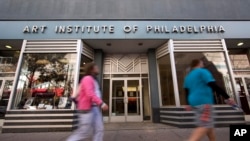
The Biden administration Wednesday said it will cancel $6 billion in student loans for people who attended the Art Institutes, a system of for-profit colleges that closed the last of its campuses in 2023 amid accusations of fraud.
Saying the chain lured students with “pervasive” lies, the Education Department is invoking its power to cancel student loans for borrowers who were misled by their colleges.
“This institution falsified data, knowingly misled students, and cheated borrowers into taking on mountains of debt without leading to promising career prospects at the end of their studies,” President Joe Biden said in a statement.
The Education Department will automatically erase loans for 317,000 people who attended any Art Institute campus between Jan. 1, 2004, and Oct. 16, 2017.
The department says it's taking action after reviewing evidence from the attorneys general of Massachusetts, Iowa and Pennsylvania, which previously investigated complaints of fraud and sued the for-profit chain.
According to the department's findings, the chain misled students about the success of graduates and about employment partnerships that would help students find jobs.
The chain told prospective students that more than 80% of graduates found jobs in their fields of study, but that was largely based on doctored data, the Education Department said. The true employment rate was below 57%.
Campuses also advertised graduate salaries that were based on fabricated data and included extreme outliers to make averages look better, the department said.
One campus included the annual salary of tennis star Serena Williams to skew the average salary, investigators found. Williams studied fashion at the Art Institute of Fort Lauderdale, Florida.
The chain's tactics led borrowers to borrow high amounts of debt for programs that didn't pay off, the department said.
“The Art Institutes preyed on the hopes of students attempting to better their lives through education,” said Richard Cordray, chief operating officer of the Education Department's Federal Student Aid office. “We cannot replace the time stolen from these students, but we can lift the burden of their debt."
On Wednesday, the Education Department will start emailing borrowers who will get their loans canceled. They won't need to take any action, and payments already made on the loans will be refunded.
At its height, the chain had dozens of campuses across the country, including in New York, Chicago, Miami and Los Angeles. It was operated for decades by Education Management Corp., which collapsed in 2018 after years of legal trouble.
The company reached a $95.5 million settlement with the Justice Department in 2015 over allegations of illegal recruiting tactics. Soon after, it began closing campuses and later sold the remainder to another company.
The final eight campuses were shuttered last year.
The Biden administration has continued to cancel student loans through several existing programs even as it pursues a wider plan for one-time cancellation. That plan is a follow-up to one that the Supreme Court rejected last year.
In total, the Democratic administration says it has approved the cancellation of almost $160 billion in student loans, including through programs for public workers and those defrauded by their schools.
Amid pro-Palestinian protests, Jewish students sue Columbia University for failing to protect them
Tensions on U.S. campuses enter a new phase as a Jewish student files a proposed class action lawsuit alleging students were displaced from Columbia University because its administration could not guarantee their safety. VOA's Natasha Mozgovaya has the story.
- By VOA News
Police arrest pro-Palestinian protesters after takeover of Columbia University building
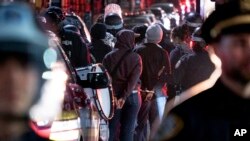
Clashes erupted early Wednesday at a pro-Palestinian protest camp at the University of California, Los Angeles, with counter-demonstrators repeatedly throwing objects and trying to dismantle barricades at the camp. On the opposite side of the country police in New York City cleared a pro-Palestinian protest site at Columbia University where demonstrators had occupied a campus building.
Officials at UCLA declared the protest, which is seeking to have the university divest from Israel, to be unlawful and in violation of university policy. The protesters and counter-protesters were initially apart from each other late Tuesday, but the situation turned more violent in the early morning hours as the counter-protesters shot fireworks, advanced on the camp barricade and repeatedly launched objects at the protesters.
There were small clashes between the two sides in front of the barricade, and while police deployed to the area at the request of university leaders, officers did not immediately separate the two sides.
In New York, police equipped with helmets and riot shields arrested dozens of pro-Palestinian protesters at Columbia University and others at The City College of New York about 20 blocks away.
A Columbia spokesman said in a statement the university’s administration decided to call in police in order to “restore safety and order to our community.”
“We regret that protesters have chosen to escalate the situation through their actions,” the spokesman said. “After the University learned overnight that Hamilton Hall had been occupied, vandalized and blockaded, we were left with no choice.”
A Columbia University faculty group criticized the administration’s decision to turn to police, saying faculty members had tried for two weeks to intervene and defuse the situation only to be rebuffed by university leaders.
"NYPD presence in our neighborhood endangers our entire community. Armed police entering our campus places students and everyone else on campus at risk,” said a statement from the Columbia University Chapter of the American Association of University Professors.
The faculty further said it would hold the university’s leaders “responsible for the disastrous lapses of judgment that have gotten us to this point."
Protesting Israel's war in Gaza and demanding university divestment from the country along with amnesty for demonstrators, students entered Hamilton Hall early Tuesday, hours after the university began suspending students for refusing to take down tents at a nearby protest site.
Hamilton Hall has been central to protests at the university since the 1960s.
White House National Security Council spokesperson John Kirby told reporters Tuesday that President Joe Biden believes students occupying an academic building is “absolutely the wrong approach,” and “not an example of peaceful protest.”
Democratic Congressman Jamaal Bowman, who represents a New York district near Columbia University, called on the school to stop what he called a “dangerous escalation.”
"Educational institutions should be spaces to nurture critical thinking skills and learn to work together with diverse communities to enact a more just and peaceful world,” Bowman said in a statement. “The militarization of college campuses, extensive police presence, and arrest of hundreds of students are in direct opposition to the role of education as a cornerstone of our democracy."
The Columbia student radio station WCKR reported that all student journalists were escorted away from Hamilton Hall, and that later they were threatened with arrest if they left the Pulitzer Hall building that houses the university’s journalism school. Still, the student journalists continued to broadcast and report on what was happening.
Due to a significant number of online listeners, WCKR experienced intermittent outages and had to lower its sound quality in order to accommodate increased demand.
Shortly after police carried out arrests at Columbia, officers also arrested pro-Palestinian protesters at The City College of New York, located about 20 blocks north of Columbia.
Building takeover
Facing calls to resign over how she has handled the protests, Shafik released a statement Monday condemning calls for violence and reiterating the university's commitment to "academic freedom and to ensuring that all members of our community have the right to speak their minds."
Insisting Columbia will not divest from Israel, Shafik said the school has instead "offered to develop an expedited timeline for review of new proposals from the students by the ... body that considers divestment matters."
After smashing through glass door panels and chaining them shut, students draped a banner reading "Hind's Hall" from an upper floor. Protesters have identified Hind as "a 6-year-old Palestinian child murdered in Gaza by the Israeli occupation forces funded by Columbia University."
Israel denies targeting civilians in its war against Hamas, alleging that militants are using civilians as human shields. More than 35,000 Palestinians have been killed in Israel's assault on Gaza, many of whom are women and children, according to Gaza's health ministry.
Israel launched its offensive in response to an Oct. 7 Hamas attack on Israel that killed about 1,200 people and saw some 250 taken hostage.
Three hours after students commandeered Hamilton Hall, Columbia University issued a notice that the campus would be closed to all except for residential students and essential employees.
Nationwide demonstrations
Students have been protesting Israel's war in Gaza on campuses throughout the country. Dozens of students were pepper-sprayed and arrested by police on Monday at the University of Texas at Austin, while students at California State Polytechnic University, Humboldt, in Arcata, California, were detained early Tuesday.
Protesters and administrators at Brown University in Rhode Island reached an agreement Tuesday for demonstrators to close their encampment in exchange for a commitment by the university to vote in October on whether to divest from Israel-linked funds.
U.N. human rights chief Volker Türk expressed concern over the force being used against protesters throughout the United States, saying, "Freedom of expression and the right to peaceful assembly are fundamental to society."
U.N. Secretary-General Antonio Guterres called it "essential in all circumstances to guarantee the freedom of expression and the freedom of peaceful demonstration."
"Hate speech is unacceptable," he said, adding that it is up to the university authorities to manage the unrest.
Chris Hannas and Liam Scott contributed to this report. Some information in this report came from Reuters, The Associated Press and Agence France-Presse.




